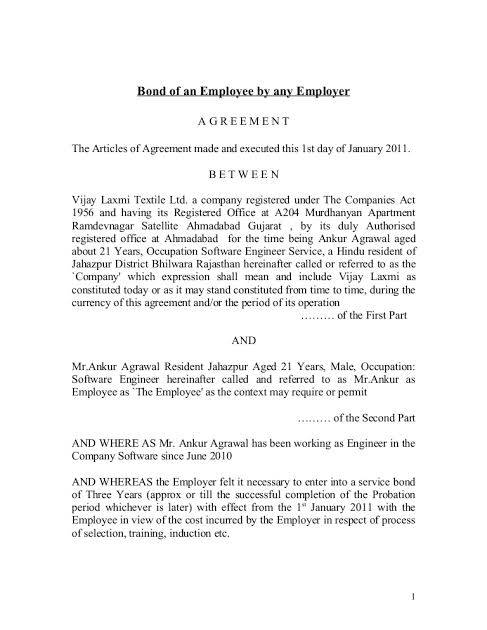Hello, good people of the internet, we welcome you to another blog of Labour Law Advisor on employment bond. The blog here will talk informatively about bonds to you today.
To start it off, let’s say that no employment bond has the authority to keep you working for the same job, well did you know that? Also with that did you know that the amounts written in the bonds aren’t payable for you? Are employment bonds legal or not? What are the clauses that can turn an employment bond into an illegal one?
With that, if you are newly employed and don’t have a single idea about employment bonds, then this blog is going to suffice the purpose for you. Most of you might be already working under a contract. The chances of working with an employer in the future who also asks you to sign a bond are very high. Read on to know more about employment bonds and other things related to employment in this blog.

Table of Contents
Employment Bond | All you need to know about it
The most common definition of a bond is a document which bounds you to serve for a job.
On the other hand, the legal definition for a bond is an agreement between the employer and the employee, an understanding with a negative covenant covered under the Indian Contract Act, 1872. The contract with negative covenants is valid and legally enforceable if the parties agree with their free consent, and without influence, undue, coercion, fraud, mistake and misrepresentation.
In simple terms, it means that both the employer and the employee should freely consent the bond without any external pressure or other factors mentioned above. But there are several other clauses which can turn the employment bond into an invalid one.
You might be wondering about what a negative covenant is after reading the legal definition of a bond. Well, it is a contrary agreement that stops you from doing work. Something that doesn’t make you bound to work but something that prevents you from working.
Generally, there are three main types of negative covenants in use surrounding a bond.
1. Duration of Stay with the Firm:
This part from the agreement of contract fundamentally decides the time-period you are going to work with the firm.
2. Not joining Competitor after Exit for a certain time period:
It states that for example, a worker in the sales sector is working for an educational publication house where his job is to distribute the books to various clients including students, schools and other distributors. In this case, if the person is leaving the sales job to join the educational publication house, then he is not allowed to join any other publication house for the next 12-18 months.
3. Confidentiality:
It states that person leaving the job cannot share any information with a competitor firm related to data, software, business architecture, terms of service and various other miscellaneous confidential matters associating with the company the person is leaving.
We will know more about all these aspects in detail further in this blog.
Also, to bring to your knowledge that a good article relating to all the negative covenants is out there by a Supreme Court advocate Mr Dilip Goswami. We will share the same in our telegram group.
For now, let us first understand the type of bonds that stand valid.
What is a Valid Employment Bond?
- The agreement has to be signed by both the parties at their free consent.
- The conditions mentioned in the bond have to be reasonable and reflect the expenditure of the company on the Employee.
- The conditions imposed on the bond must be satisfactory to safeguard the interest of the employer.
- Every bond will stand valid only when it is executed on a stamp paper of an appropriate value and enforceable.
- Ensure that there is training material that will stand as evidence and proof in the court stating that the employee was given sufficient training.
- The agreement must have a non-competition clause and confidentiality clause to ensure the company’s trade secrets are protected and secure.

When can an employer enforce the terms from the employment bond contract to an employee?
Employment bonds are enforceable if the following requirements are satisfied:
- The employer has spent money on the employee for training and grooming-related purposes.
- The said expenditure is in place of a promise from the employee that he or she would not leave the employment for the duration specified in the contract.
To summarize it, we will again discuss a case of fraud as an example. If your employer didn’t spend single money on your training, then they cannot levy a penalty against you at the time of your exit. If your employer is doing so, then it is entirely an act of fraud.
Now we will know the rulings declared by the court regarding the three main types of negative covenants in an employer bond. We will also find out whether the decisions have been in favour of the employer or the employee.
Resignation before Bond Duration:
The most important case that went to the court concerning this situation was the case between Sicpa India Limited and Shri Manas Pratim Deb. Where the company stated that employee Manas had to work with them for a duration of 36-months. Leaving the contract in between will lead to a penalty amount of Rs. 200,000 payable to the company.
In this case, the court asked the employer to reveal the actual expense spent on the employee for his training which was Rs. 67,595. The court was in favour of the employee and considering the situation that the employee has served the company for a period of 2-years declared the amount payable to the company as Rs. 22,532 only.
The case makes it clear that no matter what amount is there in the employment bond, the employer will utterly pay what is reasonable considering the circumstances. Or only the amount that might affect as a loss to the company shall be paid by an employee.
The company mentions a hefty amount on a bond only to hold an employee for a long term basis.
At the same time, the court is always for the employee. Also, the training given by the company is to benefit the company only, and it is not the other way around. Hence a fair amount is declared by the court irrespective of what is there in the bond.
Post Termination Obligation:
There are a lot of cases surrounding this type of obligations. To state as an example the case between Tico Services Limited and Mr Kaushik Pal Chowdhury, where the employee signed a non-competitor clause of not joining another employer providing services in the same sector. The court here again declared the decision in favour of Mr Chowdhury stating that the company cannot make an employee sign such a clause.
There are many cases under the same obligation which you can know by watching our YouTube video on the same topic below.
Confidentiality Clause:
In this case, if a worker in the sales sector of a company thinks that he/she can share the data with other companies while transferring, then it is legally wrong to share the data he/she is gathering while working for the previous company. As the company owners are paying you the wage for serving them.
Kris Lakshmikanth, CEO Head Hunters, says that the same shall be applied only for a course of time after which the employee can share the data with other companies or for personal benefits.
How can the Employees stand against the Bonds?
In case you are facing harassment from one such firm who has your documents and is trying to extort money out of you or forcing you to stay with their company then let us find out the legal clauses that are standing with you to claim your work-rights.
- According to an Indian Statut which says that an act of bonded labour does not exist anymore today, which means that you cannot hire an employee with a fixed contract or a bond.
- Article 19 of the Indian Constitution which deals with the fundamental rights saying that a worker can serve freely in any organization irrespective of a bond or a contract.
- According to the Indian Contract Act, any one-sided bond is considered null & void.
- Section 368 of Indian Penal Code states that any kind of extortion or harm to an employee by confiscating documents by the employer will sentence the company directors for 2+ years of jail.
Final Words:
So as far as we have come to know from the blog that if an employer is spending money on an employee’s training then either he/she can serve the notice period for the company or pay a reasonable fine amount to cover the training cost that the company had to bear for the employee.
Moreover, the recent cases of fraud where an employer is threatening an employee with hefty sums of money or by confiscating the employee’s documents are scam-cases wherein an employee should immediately contact an authorised body seeking for help.
Do check out our Labour Law Advisor blog section for other such important articles.
Do check out our YouTube video on the detailed explanation of an Employment Bond:
Join the LLA telegram group for frequent updates and documents. Download the telegram group and search ‘Labour Law Advisor’ or follow the link – t.me/JoinLLA
It’s FREE!



